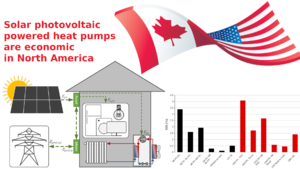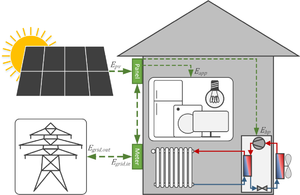
Solar photovoltaic (PV) technology is now a profitable method to decarbonize the grid, but if catastrophic climate change is to be avoided, emissions from transportation and heating must also decarbonize. One approach to renewable heating is leveraging improvements in PV with heat pumps (HPs). To determine the potential for PV+HP systems in northern areas of North America, this study performs numerical simulations and economic analysis using the same loads and climate, but with local electricity and natural gas rates for Sault Ste. Marie, in both Canada and U.S. Ground-mounted, fixed-tilt, grid-tied PV systems are sized to match 100% of electric loads considering cases both with and without air source HPs for residences with natural gas-based heating. For the first time the results show North American residents can profitably install residential PV+HP systems, earning up to 1.9% return in the U.S. and 2.7% in Canada, to provide for all of their electric and heating needs. Returns on PV-only systems are higher, up to 4.3%; however, the PV capacities are less than half. These results suggest northern homeowners have a clear and simple method to reduce their greenhouse gas emissions by making an investment that offers a higher internal rate of return than savings accounts, CDs and GICs in both countries. Residential PV and solar-powered heat pumps can be considered 25-year investments in financial security and environmental sustainability

Keywords[edit | edit source]
Photovoltaic; Distributed generation; Solar energy; hybrid system; heat pumps; electrification; renewable energy; northern climate; solar-assisted heat pumps; sustainable energy; net zero; greenhouse gas emissions
See also[edit | edit source]
- Can grid-tied solar photovoltaics lead to residential heating electrification? A techno-economic case study in the midwestern U.S.
- Decarbonizing rural residential buildings in cold climates: A techno-economic analysis of heating electrification
- Emerging economic viability of grid defection in a northern climate using solar hybrid systems
- Levelized cost of electricity for solar photovoltaic, battery and cogen hybrid systems
- Performance of U.S. hybrid distributed energy systems: Solar photovoltaic, battery and combined heat and power
- The Potential for Grid Defection of Small and Medium Sized Enterprises Using Solar Photovoltaic, Battery and Generator Hybrid Systems
- Review of solar levelized cost
- Simulations of Greenhouse Gas Emission Reductions from Low-Cost Hybrid Solar Photovoltaic and Cogeneration Systems for New Communities
- Policies to Overcome Barriers for Renewable Energy Distributed Generation: A Case Study of Utility Structure and Regulatory Regimes in Michigan
- A review of the value of solar methodology with a case study of the U.S. VOS
- Examining interconnection and net metering policy for distributed generation in the United States
- Energy Policy for Energy Sovereignty: Can policy tools enhance energy sovereignty?
- Strategic Investment in Open Hardware for National Security
- Achieving 100% Renewable and Self-Sufficient Electricity in Impoverished, Rural, Northern Climates: Case Studies from Upper Michigan, USA
- Open source decarbonization for a sustainable world
- A Free and open-source microgrid optimization tool: SAMA the Solar Alone Multi-Objective Advisor
In the News[edit | edit source]
- Scientists Want to Block Out the Sun. Should We? Is it Even Possible? - Interesting Engineering 8585, HackPosts
- Solar Panels and Heat Pumps VAT down to 0% - Starting April 2022! GreenMatch UK 180k





